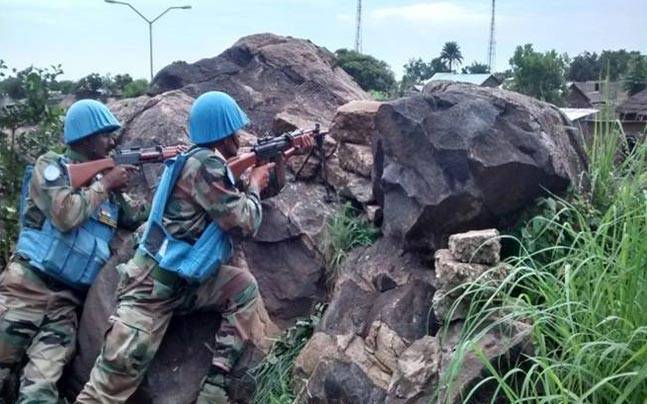Indian Army United Nations peacekeeping missions

The Indian Army has been playing an active role in promoting peace and stability around the world through its participation in various peacekeeping missions. Since the inception of the United Nations, India has been one of the largest contributors to the UN peacekeeping missions. India has sent its troops to various countries in different parts of the world, including Africa, Asia, Europe, and the Middle East, to promote peace and security.
INDIA’S CONTRIBUTION AS PEACEKEEPING FORCE IN THE WORLD
India’s contribution to the UN peacekeeping missions began in 1950, when India sent its troops to Korea as part of the UN Command. Since then, India has been an active participant in various peacekeeping missions, including in Congo, Cyprus, Lebanon, Sudan, and South Sudan. The Indian Army has been involved in these missions as part of the UN peacekeeping force, helping to maintain law and order, disarm combatants, and provide humanitarian aid to the affected population.
One of the significant contributions of the Indian Army in the UN peacekeeping missions is in Africa. India has been a significant contributor to the UN peacekeeping mission in Africa, with over 6,000 Indian troops serving in various missions in Africa. Indian troops have played an active role in maintaining peace and security in the conflict-ridden regions of Africa, such as Congo, Darfur, Liberia, and Sierra Leone.
In Congo, Indian troops have been part of the UN peacekeeping mission since 1960. India has been the largest troop contributor to the UN mission in Congo, with over 5,000 Indian troops serving in the mission. Indian troops have played an essential role in maintaining peace and stability in Congo, which has been marred by civil war and conflict for decades. Indian troops have helped to disarm combatants, provide humanitarian assistance, and protect civilians in the region.
In Darfur, Indian troops have been part of the UN peacekeeping mission since 2007. Indian troops have been involved in providing humanitarian assistance to the affected population, protecting civilians, and supporting the peace process in the region. Indian troops have played a crucial role in maintaining peace and stability in Darfur, which has been affected by a protracted conflict.
In Liberia, Indian troops have been part of the UN peacekeeping mission since 2003. Indian troops have played an essential role in maintaining law and order, providing humanitarian assistance, and supporting the peace process in the country. Indian troops have been involved in training the Liberian security forces, helping them to take charge of the security situation in the country.
In Sierra Leone, Indian troops have been part of the UN peacekeeping mission since 1999. Indian troops have played a crucial role in disarming combatants, maintaining law and order, and providing humanitarian assistance to the affected population. Indian troops have also been involved in training the Sierra Leonean security forces, helping them to maintain peace and security in the country.
Apart from Africa, the Indian Army has also played an active role in promoting peace and stability in other parts of the world. In Lebanon, Indian troops have been part of the UN peacekeeping mission since 1978. Indian troops have played an essential role in maintaining peace and stability in southern Lebanon, which has been affected by a protracted conflict. Indian troops have been involved in disarming combatants, providing humanitarian assistance, and protecting civilians in the region.
In South Sudan, Indian troops have been part of the UN peacekeeping mission since 2011. Indian troops have played an essential role in maintaining peace and stability in the newly independent country, which has been affected by a protracted conflict. Indian troops have been involved in protecting civilians, providing humanitarian assistance, and supporting the peace process in the country.
The Indian Army has been an active participant in the UN peacekeeping missions, promoting peace and stability in different parts of the world. The Indian Army has been involved in providing humanitarian assistance, disarming combatants, maintaining law and order, and supporting the peace process in conflict-ridden regions. India’s significant contribution to the UN peacekeeping missions, particularly in Africa, has been widely recognized, and the Indian Army has received several accolades for its contribution to global peacekeeping efforts.
The Indian Army’s participation in the UN peacekeeping missions has helped to promote India’s image as a responsible global player and a reliable partner in

global efforts to promote peace and security. India’s contribution to the UN peacekeeping missions is in line with its commitment to the principles of the UN Charter, which emphasize the importance of maintaining international peace and security.
Furthermore, India’s participation in the UN peacekeeping missions has helped to enhance the capabilities and professionalism of the Indian Army. The Indian Army has gained valuable experience in dealing with complex and challenging situations, which has helped to enhance its operational readiness and preparedness to deal with various security challenges.
The Indian Army’s participation in the UN peacekeeping missions has been a significant contribution to the global efforts to promote peace and security. The Indian Army has played an active role in promoting peace and stability in different parts of the world, particularly in Africa, where it has been a significant contributor to the UN peacekeeping missions. The Indian Army’s participation in the UN peacekeeping missions has helped to enhance its capabilities and professionalism, and it has also helped to promote India’s image as a responsible global player. India’s commitment to the UN peacekeeping missions reflects its commitment to the principles of the UN Charter and its desire to contribute to the global efforts to maintain international peace and security.
